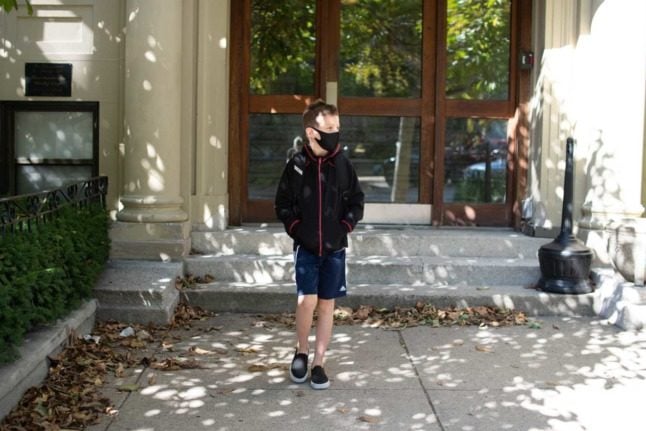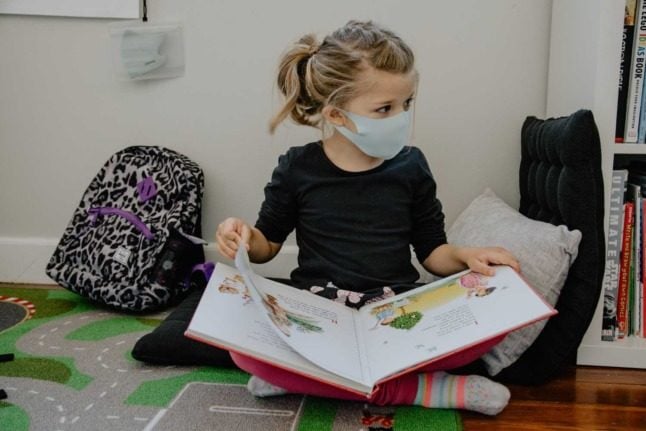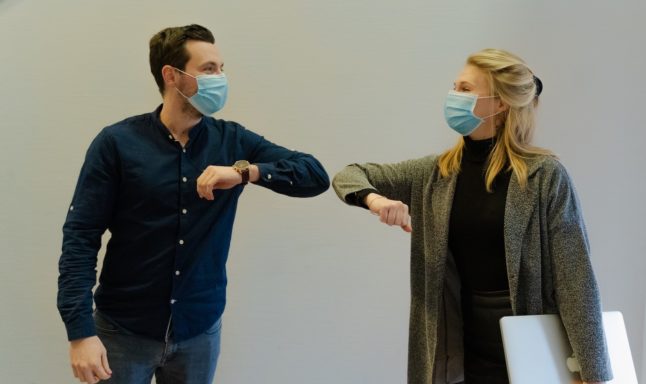As at December 14th, 2021, Switzerland’s response to the fourth wave of the pandemic has been largely cantonal.
While there are some minimum standards set by the federal government, the main rules have been put in place at a cantonal level.
READ MORE: Switzerland tells cantons to lead the fight against ‘critical’ Covid surge
This is the case for mask rules in schools, which vary widely across the country.
One in three Covid infections affect younger people
Switzerland has recently acknowledged the role played by infections among children in prolonging the pandemic.
From January, children as young as five will be able to be vaccinated against Covid.
READ MORE: How can I get my children vaccinated against Covid in Switzerland?
Every third new coronavirus infection in Switzerland affects young people under the age of 19.
Never before have so many people in this age group been infected with Covid as now: in the week from November 22nd to 28th alone, every third new infection was caused by under 19-year-olds. This trend has intensified since then, authorities said.
In many cantons there is no mask requirement in schools – not even for teachers. Repetitive testing isn’t mandatory everywhere either – and some schools that do screen are slowed down by overburdened testing labs. In many places, potentially contaminated students have to wait several days for a test result while they continue to go to school.
Urs Karrer, vice-president of Covid-19 Task Force is calling on cantons and schools to revise the “inadequate” protection concepts over the Christmas holidays.
He worries that the children will carry the infections into the family during this time. “That’s why adults should have a booster shot as quickly as possible”, he said.
Mask rules
The following is a summary of which measures are in place in which canton, including the mask rules in schools.
These are in addition to the measures in place at a nationwide level. For a summary of the measures in place at a nationwide level, click here.
Aargau
Masks must be worn in schools from grade five and above.
Covid certificates are required to visit hospitals and care facilities.
Employees in these facilities must either be vaccinated, recovered or be tested at least once per week.
Appenzell Ausserrhoden
All secondary school students and teachers in secondary schools must wear a mask.
Appenzell Innerrhoden
Covid certificates are required to work in or visit hospitals and care facilities. Masks must be worn in indoor areas, as well as in busy outdoor areas such as train station underpasses and pedestrian zones.
High school students are subject to regular testing.
Basel City
From December 6th, events with more than 300 people must be reported to cantonal officials.
Consumption in restaurants and bars needs to take place at tables, i.e. no standing room.
READ MORE: Do you need a Covid certificate to go to hospital in Switzerland?
Masks are required in schools from grade five, with masks recommended between grades one and four.
Covid certificates are required to visit hospitals and care facilities.
Basel Country
Covid certificates are required to visit hospitals and care facilities.
Masks are required in schools from grade five.
Bern
From November 29th to December 23rd, “all persons over the age of 12 who participate in an event, a market, a specialised fair or any public event are required to wear a face mask, whether or not access is restricted to holders of a certificate”, cantonal authorities said.
REVEALED: Why Covid rates in some Swiss cantons are ‘five times’ higher
The obligation to wear a mask is extended to outdoor areas of public transport waiting rooms, as well as to access to public transport.
Also, masks are required in schools, for visits to hospitals, nursing homes, and facilities for people with disabilities.
Bern authorities have taken these steps “to avoid as far as possible the need to close whole or partial sectors of activity, as has been the case in the past.
The extension of the obligation to wear a mask in schools is initially valid until January 24th, 2022. “The Bernese government is constantly monitoring developments. If necessary, it will extend or adapt these measures”.
Fribourg
Masks are required in schools from grade five if there has been a Covid case in the class.
If there has been several Covid cases at the school, masks are required for the entire school.

Geneva
Geneva this week also expanded its mask requirement for children in the fifth class and above.
Also from Monday, November 29th, “the canton has reintroduced the compulsory wearing of masks in enclosed premises, events or other areas accessible to the public, as well as in enclosed areas of workplaces and training centres”, authorities said.
Everyone over the age of 12 must comply with these rules.
These measures do not apply, however, to “establishments designed for dancing”, as the verification of Covid certificates is required in these venues, the canton said.
Glarus
Masks are only required at school in Glarus if an outbreak occurs at the school.
Graubünden
School grades third and above must wear a mask as of December 13th.
Jura
Masks must be worn at indoor events with more than 300 people, even if this event is already restricted to ‘2G’.
A Covid certificate is required for private meetings with ten or more people.
Schools must conduct Covid tests weekly.
High school students must wear masks.
Staff in hospitals and nursing homes must have a Covid certificate.
Lucerne
Students from grade one and above must wear a mask, while schools must conduct weekly tests
Visitors and staff in health care and aged care facilities need a Covid certificate.
Neuchâtel
A Covid certificate is required for private meetings with ten or more people aged 16 and over.
Secondary school students must wear masks.
Nidwalden
Visitors and staff in health care and aged care facilities need a Covid certificate.
Secondary school students must wear masks.
Obwalden
Visitors and staff in health care and aged care facilities need a Covid certificate.
St Gallen
Secondary school students must wear masks.
Visitors in health care and aged care facilities need a Covid certificate.
Schaffhausen
Visitors in health care and aged care facilities need a Covid certificate.
Hospital employees who have not been vaccinated or who have not recently recovered from the virus must be tested on a weekly basis.
Secondary school students must wear masks.
Solothurn
Visitors in health care and aged care facilities need a Covid certificate.
Students and teachers in schools must wear a mask from the fifth grade onwards.
Schwyz
Secondary school students must wear masks.
Ticino
Secondary school students must wear masks.
Visitors and staff in health care and aged care facilities need a Covid certificate.
People must also wear a mask in public indoor areas as well as busy public outdoor areas.
Thurgau
From Friday, December 10th, masks must be worn at indoor and outdoor events, as well as markets, trade fairs etc.
Tests must be conducted regularly in schools at all levels.
Uri
Visitors and staff in health care and aged care facilities need a Covid certificate.
Unvaccinated employees must be tested twice a week.
Teachers must wear masks while students are also subject to regular testing.
Vaud
The canton introduced new measures in schools from Monday and until the end of the school year on December 24th.
The wearing of the mask is reintroduced in secondary I (9th-11th grade) for pupils and teachers, including in class and during sports and singing lessons. In elementary school (grades 1 to 8), teachers are recommended to wear a mask in class and must wear it on school premises outside the classroom as well.
Employees of hospitals and nursing homes must be tested regularly if they’re not vaccinated.
Valais
A Covid certificate is required for private meetings with ten or more people.
Unvaccinated students and teachers from secondary schools, vocational schools and universities must be tested regularly.
Masks are compulsory in busy outdoor areas.
Zug
All students and teachers must wear masks in schools at all levels, although they can take off the masks when sitting at their desks.
Zurich
School students as young as grade one will be required to wear masks in the Swiss canton of Zurich.
While the measure comes into effect on December 13th, in effect Zurich it will not be implemented until January 3rd, when schools return from the Christmas holidays.
Since December 1st, students in Zurich have been required to wear a mask from grade four and above.
Zurich schools to extend mask mandate.
You can follow the developments here.



 Please whitelist us to continue reading.
Please whitelist us to continue reading.
Member comments